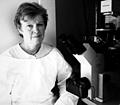 |
 |
| Harvard University virologist Ann Kiessling and the mobile infertility clinic of the Assisted Reproducion Foundation. |
Finding a Mom
 anted: surrogate mom to carry baby for single physician living in California city. No sex involved. Will use in vitro fertilization and artificial insemination. Father is HIV positive. Risk to surrogate appears minimal. anted: surrogate mom to carry baby for single physician living in California city. No sex involved. Will use in vitro fertilization and artificial insemination. Father is HIV positive. Risk to surrogate appears minimal.
Dave hasn't resorted to placing such a want ad, yet, but his situation is tough and he's a determined man. He's been struggling for four years to find a woman with whom to have a child with. First, Dave looked for a wife. Failing that, he looked for a surrogate.
"I am not willing to let HIV rob me of children and a family," he says.
In the early 1990s, Dave's life and career gleamed with promise. He had a promising practice in surgical medicine, a nice place to live and a woman he was engaged to marry. Then, Dave says, an accident in the operating room changed everything. While working on a patient, Dave says, he got stuck with an HIV-infected needle and later tested positive for the disease.
"My fiancee left me," Dave says. "We both wanted children but at that time it was impossible to do safely, with the risk of her getting infected. She decided it was more important to have children in her life than to marry me."
Dave says he also had to retire from medicine and live on disability benefits because the stigma against HIV would drive patients away. He's still so fearful of being found out that Dave asked that his real name, medical specialty, and the city he lives in be kept confidential.
For a time, Dave tried vainly to find a new girlfriend. "With this disease you are damaged goods. The last several years have been very lonely," he says.
With recent advances in both AIDS medications and infertility technologies, Dave is hoping to find a woman willing to carry his baby, no strings attached. The child would be conceived in a lab dish, using the same experimental procedure being tested in Boston to help couples with HIV have children without passing on virus. Dave says the surrogate mother could carry a child made with a donated egg if she preferred not to be genetically related to the baby. Dave says he's reviewed the limited data on pre-conception HIV-prevention procedures and, as a scientist, he believes them to be safe for the surrogate mother and the baby.
"The odds of me being struck by lightning are probably more than the woman getting HIV with this procedure," he says.
Difficult Search
But finding a willing surrogate is the problem. Dave says he's contacted dozens of commercial surrogacy agencies across they country and all refused to help. A man like Dave — single and HIV positive — makes a poor candidate, according to Hillary Hanafin, a psychologist at the nation's largest surrogacy agency, the Center for Surrogate Parenting and Egg Donation in Los Angeles.
 |
 |
| Kiessling in the mobile embryology lab. |
Surrogates are the ones who ultimately chose the people for whom they'll carry a baby, Hanafin says. "There is still a prejudice against HIV," she says. "The risk (of transmission) is never zero, and because of his HIV history, and because it's still so scary to the general population, most surrogates won't take that risk."
Another concern, Hanafin says, is that Dave's HIV may kill him before the child grows up. With no mother in the picture, she questions the fairness to the baby. Dave counters that the effectiveness of anti-AIDS drugs is improving so rapidly that he expects scientists to find a cure for the disease in the next decade (at the moment, he takes 25 pills a day to control his HIV and related problems). And besides, he argues, his forced retirement means he has plenty of time to spend with the child and a stable source of income from the disability benefits.
The director of the Assisted Reproduction Foundation in Boston, Anne Kiessling, says she's met with Dave but her fertility program has not decided whether it would accept his case.
Even considering the enormous obstacles to his plan, Dave is not interested in adopting a child. He wants a baby with genetic fibers grafted from his own family tree. And adoption agencies look askance at placing children with married couples who have HIV, let alone a single man. Though he's often bitterly discouraged at his prospects, Dave says he's also resolute.
"I'm a man on a mission," he says. "I'm the kind of person that, when I set a goal, I achieve it. It will happen. I will have a child. It may mean leaving the country (to find a surrogate), but the thought of failing is not in the picture for me."
|

